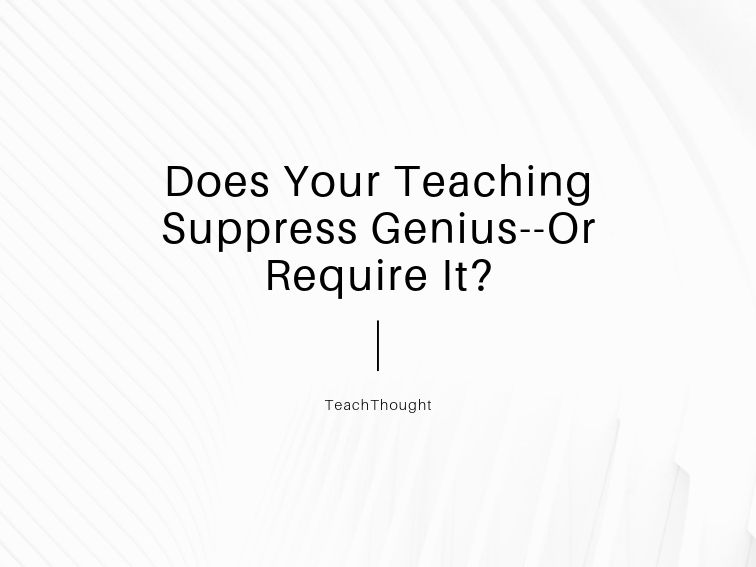Does Your Teaching Suppress Genius–Or Require It?
What happens when, after demonstrating mastery of every standard we can think of, students are exceptional at absolutely nothing?

Does Your Teaching Suppress Or Require Genius?
by Terry Heick
By design, most modern classrooms push students toward very clear and specific learning objectives.
This is what we’re learning, and when you can do this, I’ll know that you’ve learned it.
In this outcomes-based environment, ‘success’ is determined by reaching a certain ‘level’ or being able to provide evidence of understanding. Everyone in the classroom is reaching towards the same target, often with the same way of demonstrating their understanding.
Remediation is usually similar, as are rubrics and scoring guides. Who has time to create 35 authentically personalized and unique scoring guides that address individual learning needs on every assignment? Besides, that’d fly in the face of the goal a similar level of mastery (that is, proficiency) of identical academic standards. The goal of education is not personalized learning; personalized learning strategies are strategies themselves in pursuit of the very public goal of proficiency of a given set of standards. Creativity, choice, curiosity, and personalization may play roles in the learning process but stop short of reaching the content itself.
This is a long-winded way of saying that all students learn the same content via very similar pathways using almost identical resources and technology. Understanding is usually measured in exactly the same way whether the assessment is criterion-based or norm-referenced.
This isn’t a teacher problem but rather a curriculum and learning model problem–if we believe it is a problem at all. Teachers cannot be given a goal of daily mastery of documented learning targets, and oh by the way make sure the content is elegantly personalized and authentic for each student. If the curriculum is shared school or district-wide, and the learning model is primarily direct instruction (or even collaborative or project-based learning), the teacher’s role is narrowly defined at that point: Deliver content, measure progress, and intervene as best you can.
What Is Exceptional?
By definition, most people are average at most things.
We’d like to all think our children are exceptional, but if everyone is exceptional, no one is exceptional. In most ways on most days, you and I are just like everybody else. We are both are probably average teachers, average drivers, average cooks, and average parents.
To translate this to letter grades, most students should be ‘C’ students. ‘B’ represents above-average performance, and ‘A’ represents exceptional performance. If most students get As and Bs, something somewhere is off. (See here.) Even if the grading is Criterion-based and every student absolutely excels on every assignment, well then we have a rigor problem or a ZPD problem.
But there is something we do–as teachers–exceptionally well, and that thing makes all the difference. It is probably something we love. Adds to our identity as teachers. Critical thinking. Relationships. Charisma. Literacy. It’s who you are as a teacher.
And without it, you may not be teaching at all because you’d have blended in with everyone else.
One Big Comfort Zone
Between shared national standards and common daily learning targets delivered via very similar learning models, along with the reality that most students are by definition ‘average,’ we’re in a bit of a sticky situation. Even if semantics are obscuring the truth a bit here, the reality is that we’ve got ourselves a model of education that by its very design encourages repeatable and similar performance.
We’re in one big, industrial comfort zone. Similar thinking, similar strategies; same content, same classrooms. Similar teachers in similar rooms with more or less similar styles. Year in, year out.
Every now and then students–or teachers–manage to shatter the mold, but these are very literally the exceptions. This is not so much a plea for creativity in teaching and learning as it is a kind of backdrop. Life is about self-knowledge, interdependence, and affection: Who am I, how am I connected to the things and people around me, and how can I show those relationships love over a lifetime through my work? This is a very particular question that will never be the same for any two people even from the same family.
What happens when students, after demonstrating mastery of every standard on every assessment form we can think of, are exceptional at absolutely nothing? And how should we respond when that happens by design? When that was the big idea the whole time?
So now, consider your own classroom–what you teach (the content) and how you teach it (the learning models and teaching and learning and literacy strategies you employ). Does the design you use suppress the natural genius in every child? Does it stifle it, only using it occasionally and rewarding it briefly when it happens to emerge?
Or does that design necessitate and require students to find and nurture and apply their genius in new ways they couldn’t ever have anticipated without your help?
Does Your Teaching Suppress Genius–Or Require It?
